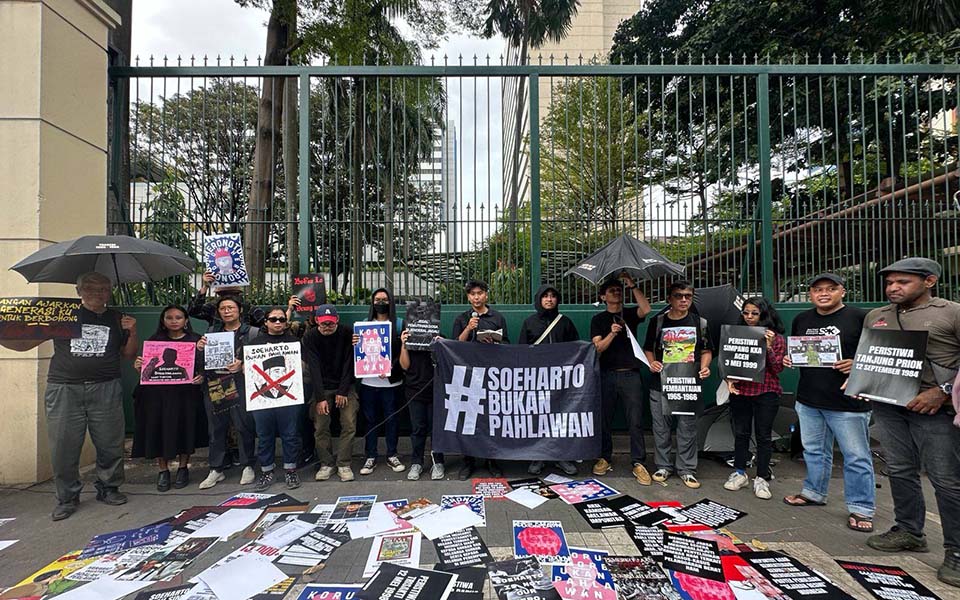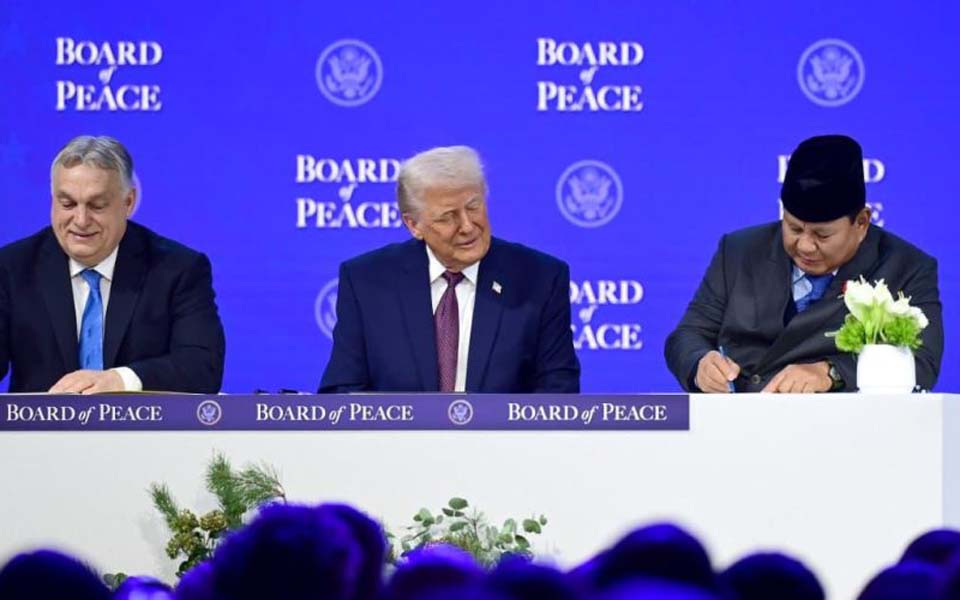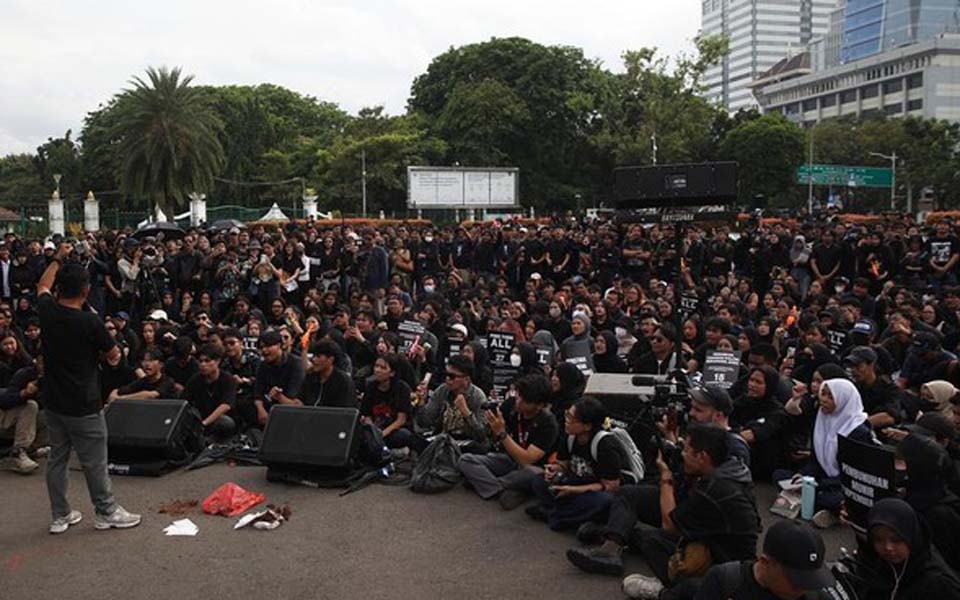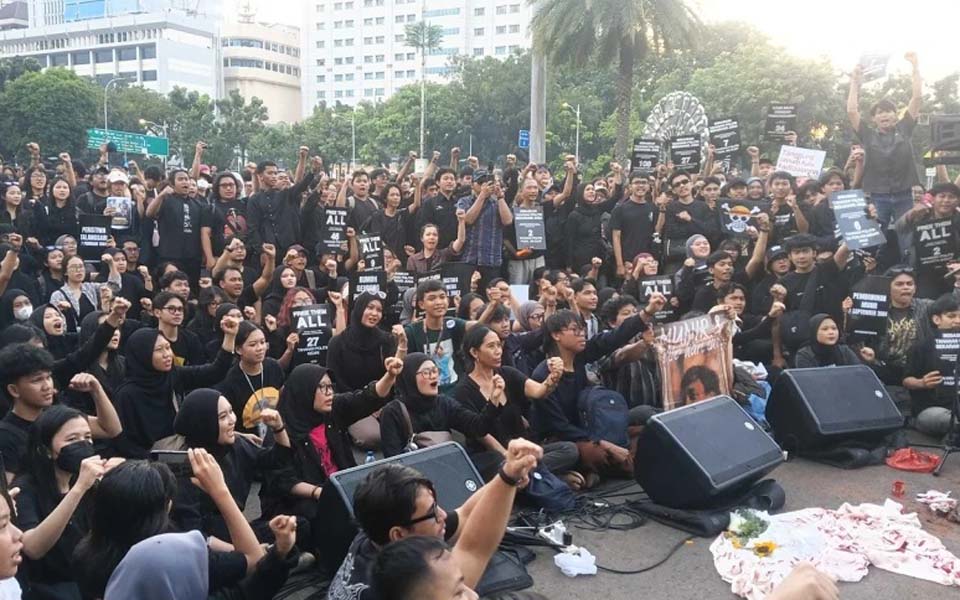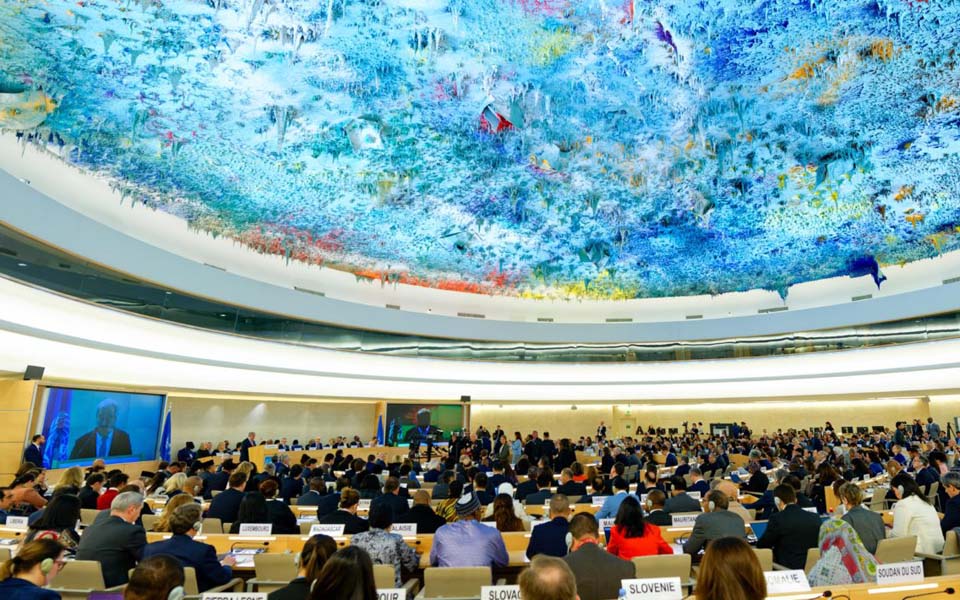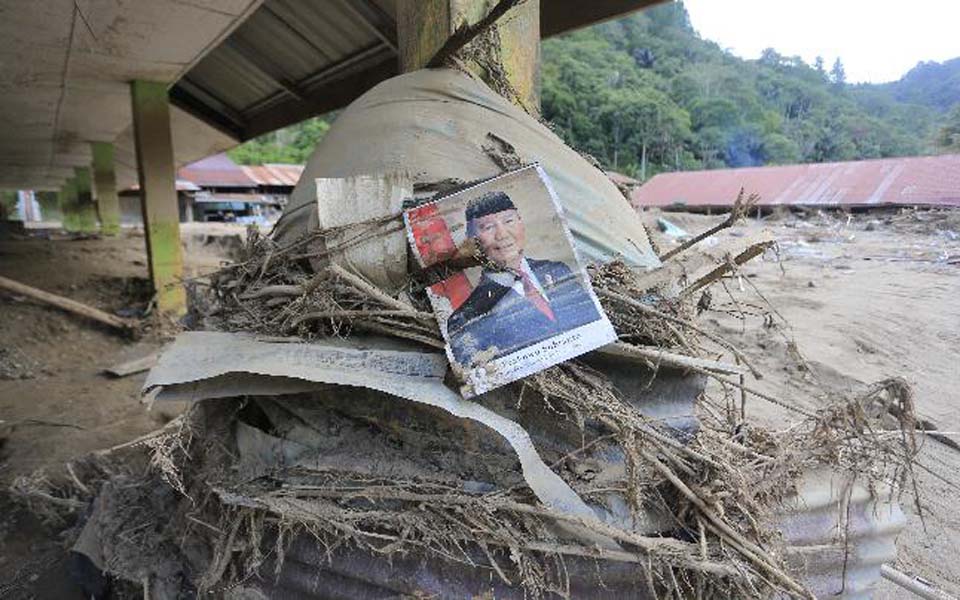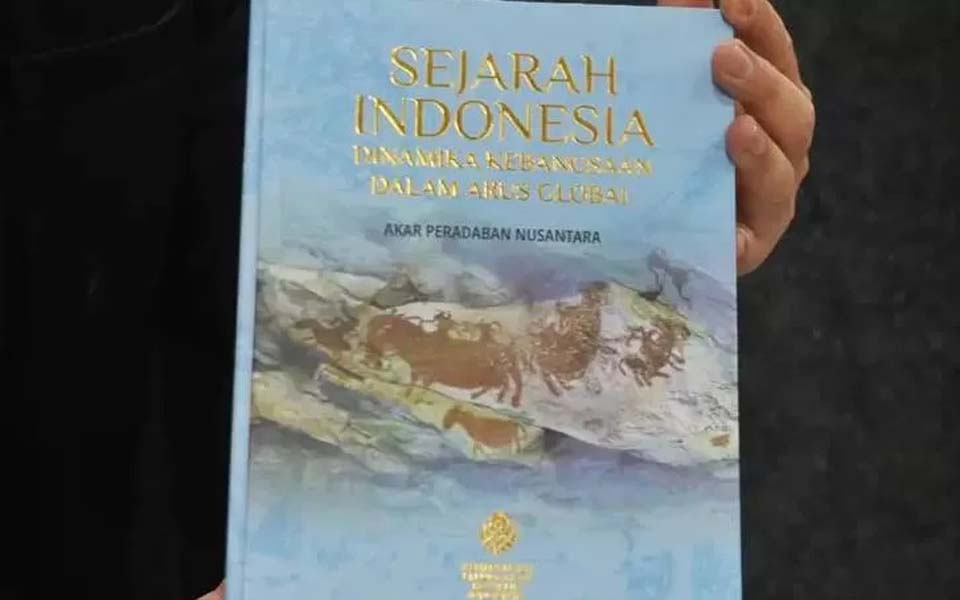The Civil Society Movement to Bring Suharto to Justice (GEMAS) strongly condemns the awarding of the title of national hero on the second President of the Republic of Indonesia H. M. Suharto and Sarwo Edhie Wibowo.
Suharto and Sarwo Edhie were among the ten names awarded the title of national hero through Presidential Decree (Keppres) Number 116/TK/2025 on the Awarding of the Title of National Hero on Monday November 10 at the State Palace. Suharto is considered a figure in the field of armed struggle and politics. The awarding of the title of national hero to Suharto now adds to, and is even the peak of a long list of haphazard awards by the state to alleged perpetrators of human rights violations.
Prior to this, several names of people involved in gross human rights violations such as former East Timor militia leader Eurico Guterres, President Prabowo Subianto himself, Defence Minister Sjafrie Sjamsoeddin, former general Wiranto, former State Intelligence Agency (BIN) chief A. M. Hendropriyono, former East Timor governor Abilio Jose Osorio Soares and former military intelligence chief Zacky Anwar Makarim, have been awarded with honorary medals.
Awarding Suharto the title of national hero is a morally flawed and an ahistorical act. This action cannot be interpreted merely as a symbolic act of awarding a former president for his perceived contribution to the events of the General Offensive against the Dutch on March 1, 1949. More than that, awarding Suharto the title of national hero implies a message that all of Suharto's rotten and bloody track record during his presidency, including the two and a half years prior to 1965, is normal. The reality actually shows that Suharto has left a dark legacy in the life of the state and society in Indonesia that can still be felt to this day.
Under Suharto's command, millions of lives were rendered meaningless and lost at the hands of state officials. His position as Indonesia's number one person served as a platform for Suharto to enrich and benefit himself, his family and his cronies through abuse of power. He created policies and a state system that operated under the paradigm of environmental destruction and exploitation. In line with his policies, which he claimed were in the name of development, the state robbed its people of their living space, including that of indigenous communities. The objectification, subjugation and oppression of women were institutionalised by Suharto in the state system and its actions. Ethnic Chinese were systematically discriminated against and marginalised by the state under his leadership. Freedom of religion and belief was severely suppressed by the state, including by the forced implementation of Pancasila ideology and the deeming local beliefs as illegitimate. Intellectual space and critical thinking were eradicated by the state, including through the genocide of a generation of Indonesian intellectuals in 1965.
Along with Suharto, Sarwo Edhie Wibowo was also one of the recipients of the title of national hero through Presidential Decree Number 116/TK/2025. Various scientific studies conducted by researchers such as John Roosa, John Hughes and Robert Cribb state that Sarwo Edhie was the commander of the Army's Para-Troop Commando Regiment (RPKAD), the troops most responsible for the massacre of people accused of being communists on the island of Java. As determined by the National Human Rights Commission (Komnas HAM) through a pro-justice investigation mandated by Law Number 26/2000 on the Human Rights Court, the events of 1965-66 represented the massacre of people accused of being communists and is classified as a gross human rights violation. Thus, the awarding of the title of national hero to Suharto and Sarwo Edhie Wibowo is no different than a form of perpetuating impunity for perpetrators of gross human rights violations.
Post 1998 reformasi – the political reform process that began with Suharto's resignation – Indonesia had actually conducted an investigation and official acknowledgement of the crimes that occurred during the Suharto administration. People's Consultative Assembly Decree (TAP MPR) Number IV/MPR/1998 acknowledged the legal crisis during the Suharto administration. Article 4 of the decree also acknowledged that Suharto and his cronies should not be excluded as parties held accountable for corruption, collusion and nepotism (KKN). In September 1998, the Attorney General's Office found indications of the misappropriation of funds from foundations led by Suharto. Then, the Supreme Court through decision Number 140 PK/Pdt/2015 ruled that Suharto's Supersemar Foundation was proven to have committed unlawful acts and was required to pay US$315,002,183 and Rp139,438,536,678.56 back to the Republic of Indonesia. Not only that, the pro-justice investigation conducted by Komnas HAM found nine incidents of serious human rights violations that occurred under Suharto's leadership as president.
Suharto's entire track record clearly contradicts the requirements of exemplary behaviour and moral integrity stipulated under Article 25 of Law Number 20/2009 on Titles, Service and Honorary Medals (GTK). Furthermore, conferring the title of national hero on Suharto also contradicts the principles stipulated in Article 2 of the GTK Law, specifically the principles of humanity, democracy, justice and openness. Although conferring the title of national hero is the president's prerogative, this right is not absolute. The principle of openness in Article 2 of the GTK Law is intended to ensure meaningful public participation as the spirit behind the awarding of titles by the state, including the title of national hero. Similar sentiments were expressed by various factions of the House of Representatives (DPR) when drafting the GTK Law. Quoting from the official minutes of the DPR's 26th Plenary Session dated May 15, 2007, Session Period IV, Session Year 2006-2007, the GTK Law was designed to ensure that the granting of titles, decorations and honours is not just a political tool that follows the wishes of the authorities, but is carried out by actively involving the community.
Furthermore, the awarding of the title of national hero to Suharto does not mean an end to the resolution of cases of gross human rights violations. Indonesia has Law Number 26/2000 on Human Rights Courts, which clearly regulates the resolution of cases of gross human rights violations. Moreover, the legal process is already underway with the Komnas HAM establishing nine cases of gross human rights violations during Suharto's administration. Furthermore, former President Joko "Jokowi" Widodo has already expressed his acknowledgment and regret over a number of gross human rights violations, including those that occurred during Suharto's administration.
In a broader context, the awarding of the title of national hero to Suharto is actually an attempt by the state to whitewash the sins of the Suharto administration. Denial and erasure of collective memory regarding the sins of the Suharto administration have already been carried out through efforts by several government officials. Previously, Yusril Ihza Mahendra, as the Coordinating Minister for Law, Human Rights, Immigration and Corrections, once stated that the events of May 1998 were not a gross human rights violation. Fadli Zon, as the Minister of Culture, once stated that sexual violence during the events of May 1998 did not occur on a mass scale. The Ministry of Culture is also currently rewriting an official history. Finally, the state has also awarded honorary medals to several individuals who are problematic in terms of cases of human rights violations. Thus, the awarding of the title of national hero to Suharto and Sarwo Edhie Wibowo is a form of condoning and justifying immoral acts, namely crimes against humanity, state violence and corruption.
In doing this, the administration of President Prabowo Subianto and Vice President Gibran Rakabuming Raka has taken a course of action that has plunged this nation into historical darkness and demonstrated its bias toward a figure who has undermined the nation's moral values and the basis of the state ideology of Pancasila. This rationalisation reflects the moral standards of governance under the Prabowo-Gibran regime, which belittles the struggles of survivors, victims and families of human rights violations, as well as the spirit of eradicating corruption, collusion and nepotism in the Republic.
For that reason, we who stand with and continue to side with the victims, survivors and families of victims of human rights violations and state violence firmly state that the awarding of the title of national hero to Suharto and Sarwo Edhie Wibowo is unacceptable because it is a practice that is against the law and is a systemic effort to marginalise efforts to reveal the truth and also uphold human rights in Indonesia.
Jakarta, November 10, 2025
Civil Society Movement to Bring Suharto to Justice
– A PDF version the statement along with a full list of organisations and individuals supporting it can be accessed at: https://drive.google.com/file/d/1hvSUcDnE4VIq-aghXZt8fIdM9PqZxz1y/view?usp=sharing
[Translated by James Balowski. The original title of the article was "Imoralitas Pemberian Gelar Pahlawan Nasional: Pewajaran terhadap Praktik Otoritarianisme, Pelanggaran Hak Asasi Manusia dan Korupsi di Indonesia".]





